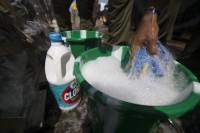5 Things You May Not Know About Disinfectants

Spring cleaning is something most of us are familiar with. Time to break out bleach and Lysol and throw open the windows with the hope of erasing the dirt and grime that has built up over colder months. Disinfectants are antimicrobial agents that are applied to non-living objects to destroy microorganisms that are living on the objects. But how much do you really know about the products you are using? These five facts may surprise you. Read on to learn more.
Disinfectants are regulated to ensure effectiveness.
The U.S. Environmental Protection Agency (EPA) regulates antimicrobial products as pesticides, requiring manufacturers to clearly label products with instructions for use as well as warnings and other information. As long as a product is registered with the EPA as a sanitizer or disinfectant, and is used according to the label, it can be used as an anti-microbial cleaner. Alternatives to bleach that are registered with the EPA are generally grouped as: quaternary ammonium compounds, iodine based sanitizers, acid anionic sanitizers (peracetic acid), and hydrogen peroxide sanitizers. Sanitizers and disinfectants each have their own benefits and limitations that are specific to the product.
Bleach will not clean your carpets, clothing, or couch.
Products approved by the EPA as disinfectants are intended to work on hard surfaces only. Any claim that these products remove harmful bacteria or viruses from porous surfaces such as carpet or fabric are inherently false.
Some laundry detergents have taken to adding Lysol or other disinfectants to their products, suggesting improved effectiveness against bacteria and germs. As a general-purpose cleaner or whitening agent, bleach is useful on both household surfaces and in laundry. In this case, it is not intended to act as a pesticide so it does not require EPA registration. Disinfectant instructions will not be included on the label of these products and their effective
Disinfectants are not designed to clean up mold.
While bleach is effective against mildew, manufacturers will maintain that disinfectants are NOT useful against mold. This contradicts many of the internet articles and blogs that suggest otherwise. As with other tough biohazard cleanup situations, mold should be handled only by a professional remediation company. Because Aftermath Services specializes in crime scene and communicable disease cleanup, we do not perform mold removal or related cleanup.
You should never mix your cleansers.
In addition to these obvious risks, one of the most concerning factors regarding the use of disinfectants is improper application. As chemicals, ammonia and bleach are not intended to be mixed with other cleaners, or serious injury may result.
Following the directions is necessary.
Disinfectants require very specific conditions in order to be effective against germs and viruses. Curing time as well as dilution ratio are two things to consider when using bleach as a cleaner. Read the label carefully. Also, never pour straight bleach on any surface – not only can it damage the surface, but it will actually be ineffective without proper dilution.
Does this sound confusing? Are you dealing with a biohazard cleanup or communicable disease cleanup where bleach just won’t do the trick? If so, you’re not alone. Aftermath technicians utilize patented proprietary rather than substances like bleach or commercial cleaners. Each cleanser we use is handled with care and consideration to both efficacy and safety because we’re concerned about the wellbeing of your home and family. Our trained staff is on call 24/7 to assist you nationwide. Just call 877-872-4339 for more information or to schedule a cleanup.
 877-872-4339
877-872-4339  Contact Us
Contact Us 






